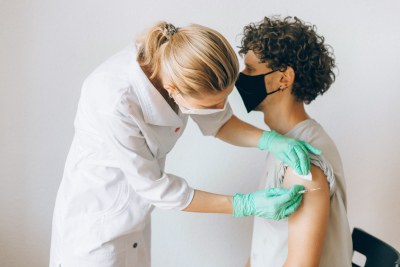


26 APRIL 2022. Countries around the world are starting to ease COVID-19 restrictions, but the pandemic is far from over and new variants such as BA.2 continue to emerge. Today, vaccines are still the most effective way of fighting the infection and a new report by the InterAcademy Partnership (IAP) – the global network of more than 140 academies of science, health and engineering – puts in the spotlight the socio-political and psychological issue of ‘vaccine hesitancy’.
IAP’s ‘Countering COVID-19 Vaccine Hesitancy’, launched during World Immunization Week 2022 (24-30 April), is based on overviews by leading experts in their fields that were presented during an IAP Global Webinar on ‘Countering Vaccine Hesitancy’. The report provides concrete examples and factual information that various groups, including academies and other scientific bodies, governments and healthcare providers, pharma companies, journalists and the media, and individuals (including individual scientists) can use to counter vaccine hesitancy and promote vaccine acceptance.
Recommendations include:
The full list of recommendations is available in Section 4 of the report, which is freely available at https://www.interacademies.org/publication/countering-covid-19-vaccine-hesitancy.
Following an Introduction, Section 2 focuses on ‘Vaccines: Development and Regulation’ and reviews how vaccines work, the main ways that vaccines are developed, and how vaccines proceed from the laboratory through the clinical trial process to registration and approval for roll-out. It also attempts to allay fears regarding some of the main causes of vaccine hesitancy.
Section 3 focuses on ‘Vaccine hesitancy: Factors that affect people’s decision to choose vaccination’ and reviews the potential causes of vaccine hesitancy, including factors that are inherently linked with individual’s dispositions (e.g., values, beliefs and attitudes), as well as factors that are dependent on the situation (e.g., the pandemic and the spread of information and/or misinformation). Special emphasis is placed on the societal factors that affect how people intercept, acquire and disseminate mis/information, including the political landscape (with increased polarisation), the knowledge landscape (with distrust in scientists) and the media landscape (with an increased risk of spread of different kinds of false information). This section concludes by reviewing some ways in which academies and other scientific organisations can begin to address the causes behind people’s vaccine concerns.
“In any population, there are people who will accept a given vaccine, and people who will strongly reject it. Then there are those in the middle who are undecided – hesitant –and may need more information or gentle persuasion in order to accept the vaccine. As these people may comprise a significant proportion of any given population, it is critical that we address this hesitancy in order to persuade as many as possible to accept a COVID-19 vaccine,” said Sir Richard Catlow, IAP co-president and former foreign secretary of UK’s Royal Society.
“Achieving this goal will not only require knowledge of the relevant scientific facts, but also an understanding of the reasons behind people’s reluctance to embrace vaccination, which likely also requires an understanding of their psychologies, their in-groups (i.e. the social group/s to which a person psychologically identifies as being a member), and engagement with the media, including especially social media”, adds Depei Liu, IAP co-president and former vice president of the Chinese Academy of Engineering.
[ENDS]
Note to editors
The report is based on the following presentations:
IAP presidents and sessions’ presenters are available for interviews.
About the InterAcademy Partnership (IAP)
Under the umbrella of the InterAcademy Partnership (IAP), more than 140 national, regional and global member academies work together to support the vital role of science in seeking evidence-based solutions to the world’s most challenging problems. In particular, IAP harnesses the expertise of the world's scientific, medical and engineering leaders to advance sound policies, improve public health, promote excellence in science education, and achieve other critical development goals.
IAP’s four regional networks - AASSA, EASAC, IANAS and NASAC - are responsible for managing and implementing many IAP-funded projects and help make IAP’s work relevant around the world. More information about IAP can be found at https://www.interacademies.org, on Twitter at @IAPartnership, on LinkedIn and YouTube. The full report ‘Countering Vaccine Hesitancy’’ is available at:https://www.interacademies.org/publication/countering-covid-19-vaccine-hesitancy.
Press contact
Giovanni Ortolani, IAP Communication Assistant
Email: gortolani@twas.org
